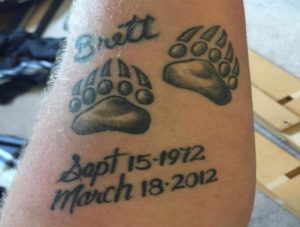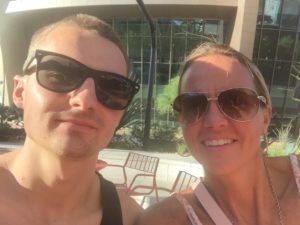I come from a long line of alcoholics, which is now known as substance use disorder (SUD). I say this with complete love and respect for my loved ones, and even though no one discussed this within my family, from the time I was a 5-year-old child it was impossible to ignore as I could see the devastation, heartbreak, and struggle with my own two eyes.
However, what wasn’t so obvious was that mental illness also ran in our family. Anxiety, depression, and bipolar disorder was, and continues to be, a well-kept family secret.
But silence and secrets perpetuate an unhealthy environment of shame. I know, because I was that little girl once, the one who overheard secret whispers. And although no one told me directly, the message was loud and clear, “Addiction and mental illness are shameful, you don’t ask questions; you look the other way and you hide them at all costs.”
We need to begin the conversation in our own homes. No one will ever find the courage to seek help or speak publicly if we can’t even speak about these topics privately in our own families.
My son, Ryan, started struggling with severe anxiety in Grade 1. With no explanation, advice, or whisper from my family that this might be a non-obvious kind of illness — something that is sometimes called an “invisible illness.” His dad and I were left on our own for months trying to maneuver our way through what was causing his panic attacks and tears. At appointment after appointment, while poking and prodding Ryan, and carrying out countless blood tests and medical exams, doctors assured us there was nothing wrong with him physically.
I was tortured. What is happening with my little boy? How can I make this better for him?
With no other explanation at the time, I was convinced that he must have been sexually abused at school. I was so relieved to find out eventually that I was wrong. I can’t help but think about how much time, effort, and unnecessary trauma we caused our young son. Had we known earlier about the mental illness in our family tree, we might have all walked an easier path.
Years later, we lost a much-loved member of our family — a sweet, kind, sensitive, soft-spoken man — to alcohol addiction and mental illness. My younger brother, Brett, Ryan’s uncle, lost his brave battle in March 2012. He was 39. I watched helplessly as shame and discomfort stopped him from talking about his feelings, broke down his spirit, and made him feel that the situation was hopeless.
And it wasn’t hopeless.
I was raised in the 1970s. It wouldn’t have been a reasonable expectation to have these open discussions back then, and I accept that. But I can’t help wondering if things might have turned out differently for my brother if we had worked through some of our early childhood trauma in our adult lives.
But we can’t go back; life is about moving forward. My perspective is that I am blessed and proud to be part of a changing world where we are encouraged to speak openly and honestly about our experiences, including addiction and mental health. And I believe that encouragement starts with young children.
Years later, Ryan and I were reminded once again that life has unexpected challenges and doesn’t always go as planned.
On June 3rd, 2017, I had a mental health breakdown that landed me in the hospital.
One day I was myself; the next day I wasn’t. During the next twelve months, I came to understand firsthand what it is like to wrestle with thoughts and feelings you can’t control, thoughts that plague your mind every waking moment as I fought my way through fear, anxiety and clinical depression.
Since my son was a little boy, I tried to do things differently than how it was done in my family when I was a child. Ryan and I have always talked about things openly, ever since that first experience when he was 6 years old. We discussed understanding his feelings and anxiety, and later addiction and the dangers of self-medicating with alcohol. We did that all so that he is aware not only of himself, but has empathy and compassion for others; you never know what someone else is going through.
I have two young nieces who were only 6 and 13 when their beloved Uncle Brett died. Unlike other family members of mine, I have spoken to my nieces openly and truthfully ever since that very day. As they grow up, I talk about the topic more in-depth, being sensitive to how old they are at the time; always with honesty, love, and without shame.
My niece Kaddi is now 12 she graduated last year from the sixth grade. The class had to do an oral report on a topic that meant something to them, and she chose alcoholism. She is as comfortable speaking about it as she is with the knowledge that her grandmother passed away from breast cancer before she was born. I was overwhelmed with pride and thought to myself, “I hope that teacher knows how amazing and brave that little girl is.”
Her sister, Payton, is now 19. She has a big bold tattoo on her left arm of bear paws bearing Brett’s name. When people ask what it means, she answers kindly, lovingly, and honestly, “That is my uncle who struggled with alcoholism and died by suicide.”

I am proud to see those qualities in my son; he is no longer a child, but a 25-year-old man. It should not go unnoticed that one of the traits I am most proud of is his desire to challenge himself and come out of his comfort zone. As he is typically more reserved and has a quiet personality. His commitment to help others by being a positive role model not only to young boys but to grown men is admired. He knows that it does not make us weak to talk about our feelings and to reach out for help. We could use more people like him in this world, as his quiet demeanor means he listens and sometimes that is all someone needs, someone to listen.

(Jodee Prouse, CEO of Seriously Shea & her son Ryan)
We both know how blessed we are every minute of every day, and that some people aren’t so fortunate for a variety of reasons, including possibly not having the loving support of friends and family. It is important to both my son and I to give back and to use our experiences to bring people together, to give them strength to speak their truth.
When we created Seriously Shea, we talked in depth about creating a different kind of company. We knew we would reach a lot of people, so we asked ourselves, “How can we use this opportunity to do good?”
We believe that being happy and health starts from the inside out.
A portion of sales of all our products will be donated to mental health programs and organizations for both adults and children.
We share in Born This Way Foundation’s core values supporting the wellness of young people and empowering them to build a kinder and braver world and to eradicate the stigma around mental health.
On December 5, 2016, Born This Way co-founder Lady Gaga posted on her twitter,

My son Ryan and I couldn’t agree more.
This article was previously posted on Born This Way, Channel Kindness platform in September 2018. https://www.channelkindness.org/empowering-children-through-knowledge/

